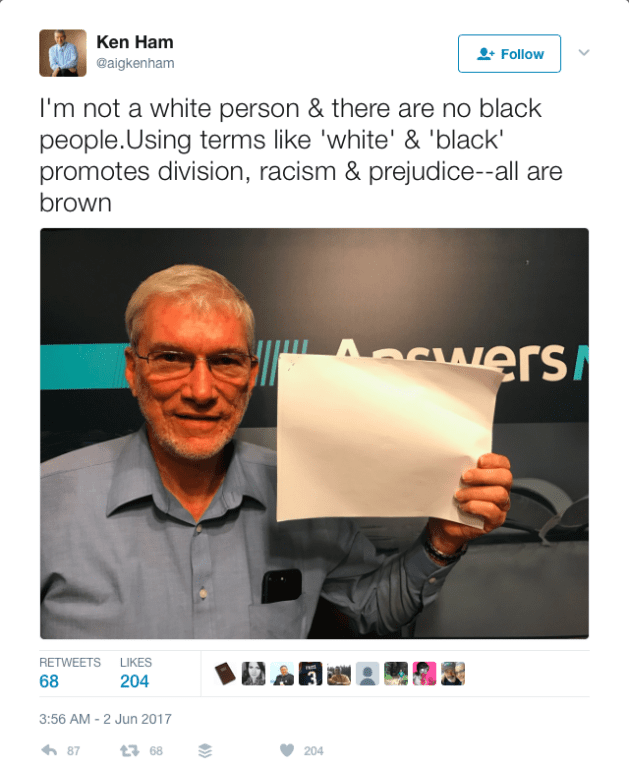Before we go on and dig further into this issue, I want to note that renowned creationist Ken Ham hit the blogosphere recently with this tweet:
 Text of tweet: I’m not a white person & there are no black people.Using terms like ‘white’ & ‘black’ promotes division, racism & prejudice–all are brown
Text of tweet: I’m not a white person & there are no black people.Using terms like ‘white’ & ‘black’ promotes division, racism & prejudice–all are brown
This feels like another version of the “I don’t see color” statement. Proclaiming that color doesn’t exist doesn’t change the fact that people are treated differently based on their color. Race may be socially constructed, yes, but that doesn’t make it not real, and to suggest otherwise is to put your head in the sand. Furthermore, blaming racism on terms is highly disingenuous.
In recent years, a growing number of individuals and articles have critiqued the “colorblind” approach. “White millennials are the product of a failed lesson in colorblindness,” wrote Mychal Denzel Smith for PBS News Hour.
…with respect to this particular generation, the Millennials, the education these young white people have received have left them ill-equipped to understand the nature of racism and subsequently supplied them analysis that won’t address the problem. As children of the multi-cultural 1980s and 90s, Millennials are fluent in colorblindness and diversity, while remaining illiterate in the language of anti-racism.
This shouldn’t be surprising. Claiming to be colorblind—that you don’t “see” race—does not change the reality that people with black and brown skin continue to face discrimination, and that centuries of race-based violence and oppression have created a system laced with inequities. It may, however, make it more difficult for you to recognize and grapple with these realities.
In conducting research on the attitudes of those who identify themselves as colorblind, Professor Brendesha Tynes has found that these individuals are more likely to brush off incidents such as racially themed college parties and less likely to recognize these activities as racist.
According to Tynes, a color-blind racial attitude is the prevailing racial ideology of the post-Civil Rights era, and is the view that seeing race is inherently wrong.
“If you subscribe to a color-blind racial ideology, you don’t think that race or racism exists, or that it should exist,” Tynes said. “You are more likely to think that people who talk about race and racism are the ones who perpetuate it. You think that racial problems are just isolated incidents and that people need to get over it and move on. You’re also not very likely to support affirmative action, and probably have a lower multi-cultural competence.”
Let’s return to the text of Ham’s tweet:
I’m not a white person & there are no black people.Using terms like ‘white’ & ‘black’ promotes division, racism & prejudice–all are brown
Who uses the terms “white” and “black”? Oh I don’t know, maybe anti-racism activists. If using these terms is the problem, those fighting racism are part of the problem. This goes back to what Tynes said—those who don’t “see” race are more likely to think that people who talk about racism—people like Ta-Nehisi Coates, for example—are perpetuating racism simply by talking about it.
A recent study of my community found that black drivers are searched by police nearly ten times more frequently than white drivers. The “colorblind” individual would look at this data and say that black drivers must be doing something different from white drivers—in other words, they would give police the benefit of the doubt and move on. The race-conscious individual would look at this data and see the continuation of historic over-policing of our nation’s black communities—and then create a citizens police advisory committee to review citizen complaints and police training.
Talking about racism is not the problem. Racism is the problem. Ham may think he’s helping—he may believe, for instance, that he is communicating to racists that they should look beyond racial differences—but in fact his statements end up promoting the preservation of a racist status quo by painting those fighting racism part of (or all of) the problem. The idea that people need to just stop talking about race is the modern day equivalent of the white moderate so heavily critiqued by Martin Luther King, Jr., in his Letter from a Birmingham Jail.
Or in other words: You’re not helping, Ken Ham.
I have a Patreon! Please support my writing!















